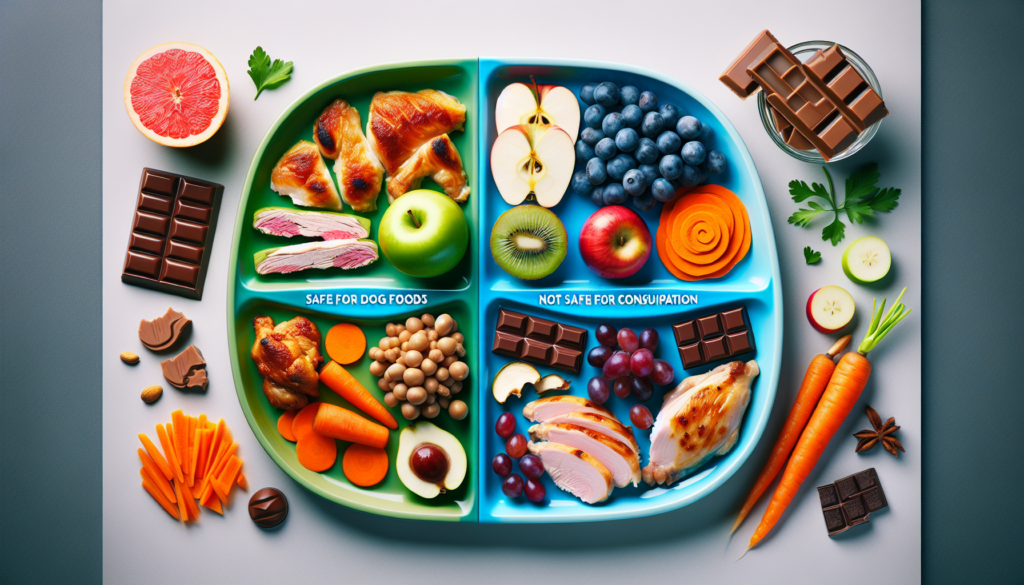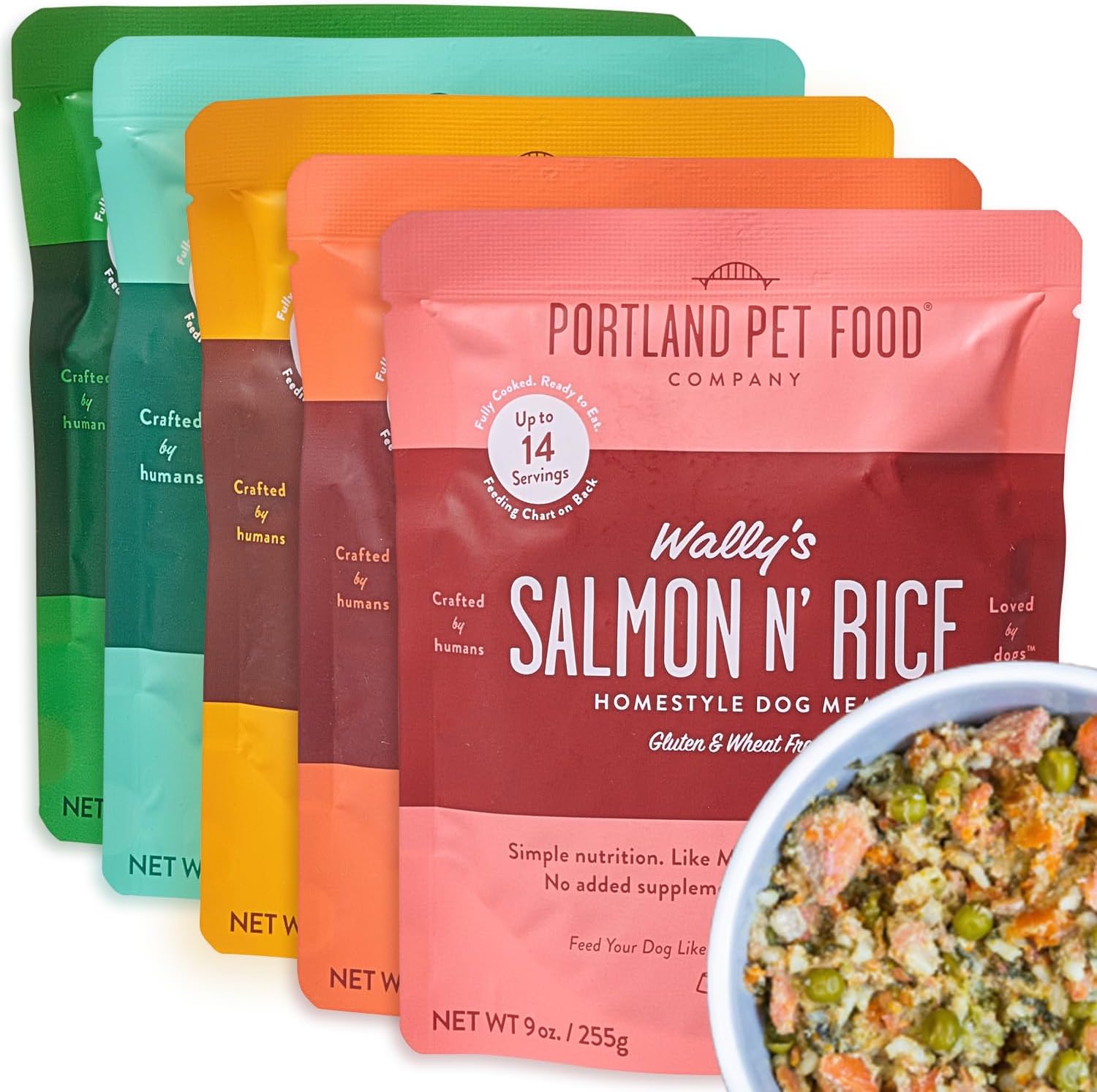Are you ever tempted to share your meal with your furry friend? While it’s important to remember that dogs have different dietary needs than humans, there are actually some human foods that are safe for them to enjoy in moderation. On the other hand, there are also several foods that should never be given to dogs as they can be harmful or even toxic. In this article, we will explore the human foods that dogs can safely eat and those that should be avoided, ensuring you can make informed decisions to keep your beloved pup happy and healthy.
Human Foods Dogs Can Eat
Lean Meats
Lean meats, such as cooked chicken, turkey, and beef, can be a healthy addition to your dog’s diet. Make sure to remove any bones, skin, and excess fat before serving it to your furry friend. Lean meats are a great source of protein, which is essential for dogs to maintain strong muscles and a healthy immune system.
Fish
Fish, particularly salmon and sardines, are excellent sources of omega-3 fatty acids, which are beneficial for your dog’s skin and coat health. You can feed your dog cooked fish, making sure to remove any bones and seasonings. Fish can also provide a good source of protein and vitamins, making it a nutritious treat for your canine companion.
Vegetables
Many vegetables are safe and nutritious for dogs. You can feed your furry friend cooked or raw vegetables such as carrots, peas, green beans, and sweet potatoes. These vegetables are low in calories and rich in vitamins and fiber, which can help improve digestion and contribute to overall canine wellness. Remember to chop the vegetables into appropriate sizes to prevent choking hazards.
Fruits
Fruits like apples, bananas, blueberries, and watermelon can be a tasty and healthy addition to your dog’s diet. However, be cautious about the seeds and stems of certain fruits, as they can be harmful. Remove the seeds and core from apples, and make sure the bananas are peeled before sharing them with your dog. Fruits are loaded with vitamins, antioxidants, and natural sugars, so remember to offer them in moderation.
Dairy Products
While many dogs are lactose intolerant, some can handle dairy products in small quantities. Plain, unsweetened yogurt and cottage cheese are rich in calcium and protein, beneficial for your dog’s bone health. However, be mindful of your dog’s individual tolerance and avoid giving them dairy products if they cause any digestive issues or discomfort.
Grains
Certain grains like rice and quinoa can be a healthy addition to your dog’s meals. Cooked grains can provide additional carbohydrates and fiber, which can aid in digestion and provide a feeling of fullness. Avoid adding seasonings or additives when preparing grains for your dog, and make sure they are fully cooked and cooled before serving.
Eggs
Eggs are an excellent source of protein and essential fatty acids for dogs. You can serve them cooked, either scrambled or boiled, but make sure they are fed plain, without any added salt or seasoning. Eggs can be a great occasional treat or mixed into your dog’s regular meals to add some variety and nutritional benefits.
Peanut Butter
Peanut butter is a favorite treat for many dogs, and thankfully, it can be enjoyed in moderation. Make sure to choose an all-natural peanut butter brand that does not contain xylitol, a sweetener that is toxic to dogs. Peanut butter is a good source of protein and healthy fats, and it can be used as a filling for interactive toys or as a tasty reward during training sessions.
Coconut
Coconut, in both its flesh and oil forms, can offer some health benefits for dogs. The flesh can be given as a treat, and the oil can be added to their food in small quantities. Coconut provides medium-chain fatty acids, which can help support healthy skin and a shiny coat. As with any new food, introduce coconut gradually to your dog’s diet to ensure they tolerate it well.
Yogurt
Plain, unsweetened yogurt can be a nutritious addition to your dog’s diet. It contains beneficial bacteria that can promote a healthy gut and improve digestion. Yogurt can also be a refreshing and tasty treat during hot summer days when frozen into small portions. However, like with other dairy products, monitor your dog’s reaction to yogurt and adjust the amount based on their tolerance level.

Human Foods Dogs Can’t Eat
Chocolate
Chocolate is toxic to dogs and should be strictly avoided. It contains a compound called theobromine, which can cause symptoms such as vomiting, diarrhea, increased heart rate, and even seizures in dogs. The darker the chocolate, the higher the theobromine content, making it even more dangerous. Keep all chocolate products out of your dog’s reach to ensure their safety.
Grapes and Raisins
Grapes and raisins, although seemingly harmless, can be toxic to dogs. Even in small quantities, they can cause kidney failure, leading to serious health complications. It’s best to keep these fruits away from your furry friend and be cautious of foods and snacks that may contain them, such as certain baked goods or trail mixes.
Onions and Garlic
Onions and garlic, in all forms (raw, cooked, powdered, or even as an ingredient in various dishes), should be avoided in your dog’s diet. These vegetables contain compounds that can damage your dog’s red blood cells and potentially cause anemia. Symptoms may include weakness, pale gums, and loss of appetite. Play it safe by keeping all dishes seasoned with onions or garlic away from your pup.
Avocado
Avocado can be toxic to dogs due to a compound called persin. While the flesh itself is not always harmful, it’s best to avoid feeding avocado to your dog in any form. Avocado ingestion can lead to symptoms such as vomiting, diarrhea, and difficulty breathing. Keep your guacamole to yourself and don’t share it with your furry friend.
Alcohol
Alcohol is extremely dangerous for dogs and can cause severe poisoning symptoms. Even small amounts of alcohol can lead to respiratory distress, seizures, and even coma. Keep alcoholic beverages out of your dog’s reach at all times, and be cautious during social gatherings or parties where drinks may be easily accessible to curious pups.
Coffee, Tea, and Other Caffeinated Beverages
Caffeine, found in coffee, tea, energy drinks, and other caffeinated beverages, can be toxic to dogs. It can cause symptoms such as restlessness, increased heart rate, muscle tremors, and in severe cases, even heart palpitations. Keep caffeinated beverages out of your dog’s reach and dispose of used coffee grounds or tea bags safely to prevent accidental ingestion.
Nuts
Some nuts, such as macadamia nuts, can be toxic to dogs. Ingestion of macadamia nuts can lead to symptoms like weakness, tremors, vomiting, and increased body temperature. It’s best to avoid feeding any kind of nuts to your dog and ensure they are not accessible in your home. Be cautious of baked goods or desserts that may contain nuts and keep them out of your pup’s reach.
Raw Meat and Fish
Feeding raw meat or fish to your dog can pose various health risks. Raw meat can contain harmful bacteria or parasites, such as salmonella or E. coli, which can cause gastrointestinal upset, vomiting, and diarrhea in dogs. Cooking meat and fish thoroughly before feeding them to your dog eliminates these risks, making them safe and healthy additions to their diet.
Xylitol
Xylitol is an artificial sweetener commonly found in sugar-free candies, gums, baked goods, and some peanut butter brands. Xylitol is highly toxic to dogs and can cause hypoglycemia (low blood sugar), which may lead to seizures, liver failure, or even death. Always check food labels for xylitol content and keep any products containing this sweetener away from your furry friend.
Dairy Products
While some dogs can tolerate small amounts of dairy products, many are lactose intolerant. Dairy products can cause digestive issues, such as diarrhea or upset stomach, in dogs who lack the enzymes to properly digest lactose. It’s best to avoid giving your dog dairy products altogether or choose lactose-free alternatives if you want to offer them a similar treat.
In conclusion, while there are many human foods that can be safely shared with dogs, it’s essential to be aware of harmful foods that should be strictly avoided. Providing a balanced and nutritious diet for your canine companion is vital for their overall health and well-being. When in doubt, consult with your veterinarian to ensure the foods you share with your dog are suitable and safe. Remember, a happy and healthy pup is a well-fed pup!





